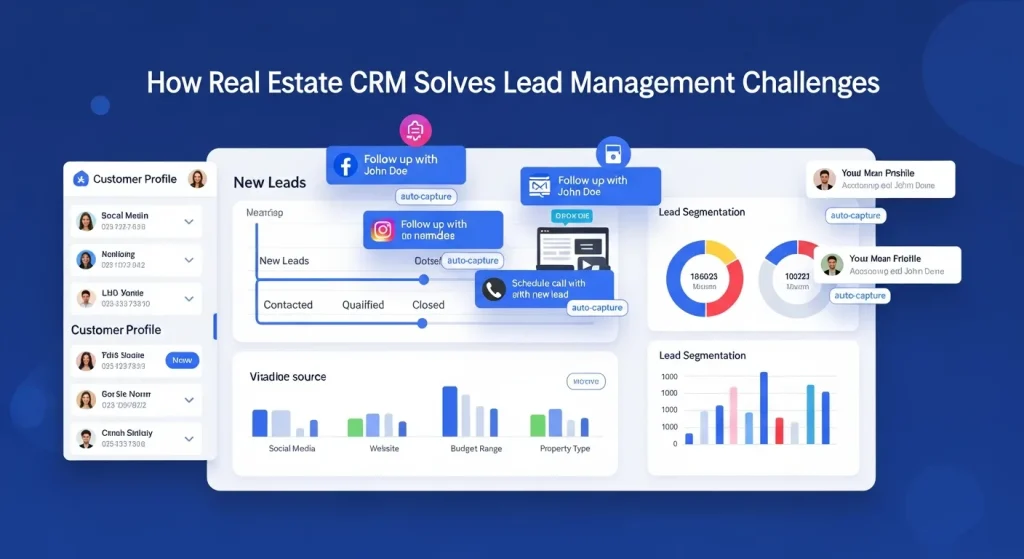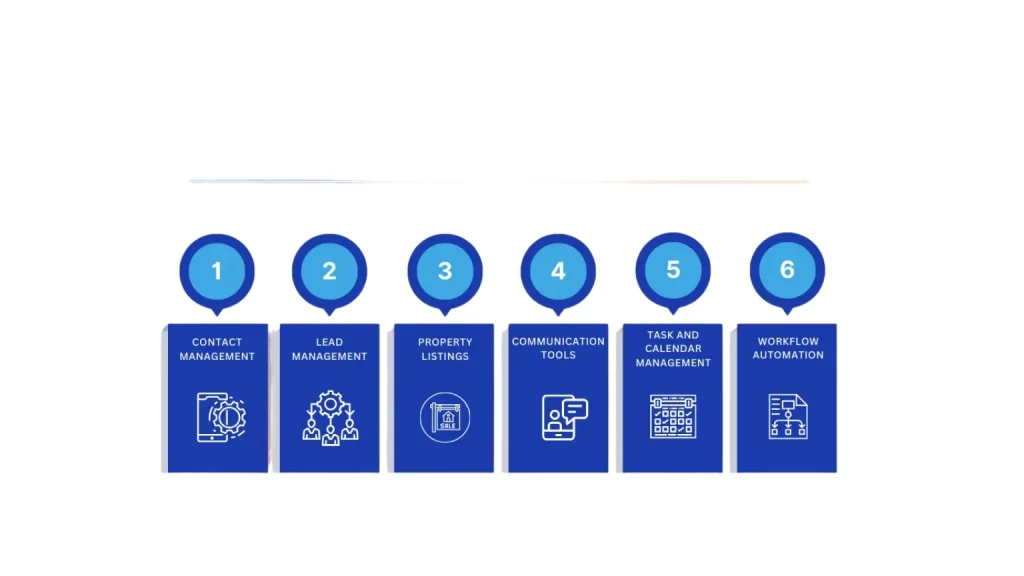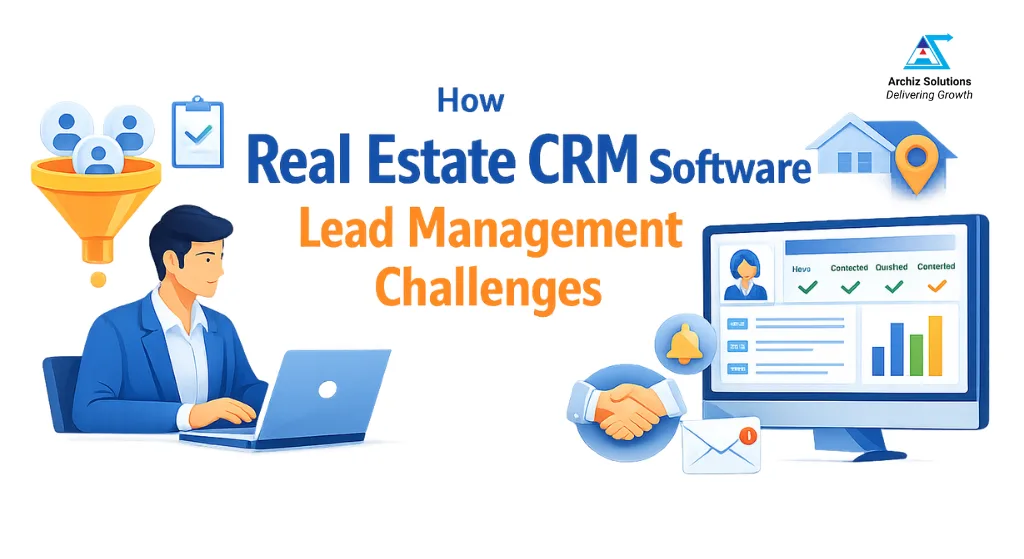How Real Estate CRM Improves Lead Management for Brokers and Agents
Managing leads is one of the biggest challenges for real estate brokers and agents today. Without a streamlined process, potential buyers and sellers can easily fall through the cracks, resulting in lost opportunities. Common issues like delayed follow-ups, incomplete contact lists, and slow responses damage client relationships over time.
A real estate CRM solves these problems by automating lead management, ensuring every lead is captured, nurtured, and followed up on time. With a powerful real estate CRM, brokers and agents can automate lead capture, qualify prospects, organize contacts, and build stronger customer relationships — all from one platform. By investing in the right CRM, real estate professionals stay ahead of the competition and maximize every opportunity.
Typical Lead Management Challenges in Real Estate
1.Follow-ups on delays translate into lost sales.
Time is of the essence in real estate. When a potential buyer contacts an agent, he or she is looking for a prompt response. Most real estate agents, however, use conventional tracking methods such as notebooks or spreadsheets, which can be time-consuming. According to a study, agents who respond within five minutes are 100 times more likely to close a lead than agents taking 30 minutes or more.
2.Organizing Leads of Different Origins
Real estate leads come from a variety of locations, including web leads, social media marketing, referrals, and listing websites. It is highly likely to end up disorganized with no organized system when handling leads from diverse origins. Agents find it challenging to monitor interaction, follow-up, and status for every lead.
3.Slow response times deter
Lagging behind to respond to a question from a prospective client will lose them to another agent. Most buyers and sellers call several agents simultaneously. If one agent fails to respond on time, the lead will be lost elsewhere. A real estate CRM will ensure that all the questions are recorded and answered in time.
How Real Estate CRM Changes Lead Management

1.Automating lead capture from multiple sources
An auto-accumulated lead management real estate CRM will automatically take in leads from many different sources and put them into a database. Whether the lead is coming from a social media source, an internet form submission, or a phone number, the CRM takes the information and puts it into the hands of the right agents.
2.Setting Up Reminders to Follow Up on Time
Automatic reminders assist the agents in timely follow-up with leads. The CRM can send a reminder to follow up through a phone call, email, or property listing so that the lead is not lost due to an agent forgetting.
Leads are not equal. They are first-timers or investors seeking luxury property. A CRM enables real estate professionals to sort leads based on budget, geographical preference, and type of property, thus making communication targeted.
Most Important Features of a Real Estate CRM

Lead Management
Effective lead management Software is essential for growing your clinic. A Clinic Management System (CMS) with lead management capabilities can help you track potential patients from their first inquiry to appointment booking. It allows you to organize leads based on their stage in the patient journey, nurture them with personalized communication, and improve conversion rates.
With built-in lead tracking, clinics can monitor where inquiries come from — such as website forms, social media, or phone calls — and ensure timely follow-ups, preventing lost opportunities.
Key benefits:
Centralized lead tracking
Automated follow-up reminders
Better conversion rates
Insights into marketing effectiveness
Contact Management
Every clinic interacts with hundreds, sometimes thousands, of patients and vendors. Efficient contact management is crucial to maintain strong relationships. A good clinic management system organizes all contacts in one place, recording personal details, communication history, visit records, and billing information.
This ensures that anyone on your team can quickly access a patient’s information without delays, enhancing service quality and building trust.
Key benefits:
Full patient history at your fingertips
Enhanced relationship management
Reduced administrative errors
Improved patient satisfaction
Property Management
For clinics operating across multiple locations or managing different departments, property management functionality is vital. This feature allows you to manage different facilities, resources, and assets effectively from one centralized platform. Whether it’s room booking, equipment allocation, or maintenance scheduling, property management tools within a CMS ensure your physical operations run smoothly.
Key benefits:
Centralized facility and asset management
Streamlined operations across multiple locations
Reduced equipment downtime
Improved resource utilization
Communication Tools
Effective communication is at the heart of every successful clinic. Integrated communication tools within a clinic management system enable seamless interaction with patients and staff through emails, SMS, and instant notifications.
You can send appointment reminders, treatment updates, payment alerts, and important announcements directly from the system. Two-way communication capabilities also allow patients to confirm or reschedule appointments easily.
Key benefits:
Automated patient reminders and alerts
Reduced no-shows and cancellations
Better staff coordination
Enhanced patient engagement
Task and Calendar Management
Keeping track of tasks and appointments manually is inefficient and risky. Modern clinic management systems come with built-in task and calendar management features that help your team stay organized.
Doctors, administrative staff, and management can view their schedules, assign tasks, set priorities, and track deadlines. With shared calendars, the entire team stays synchronized, minimizing scheduling conflicts and missed appointments.
Key benefits:
Centralized task tracking
Efficient time management
Increased staff accountability
Improved patient flow
Workflow Automation
Manual workflows are prone to errors and inefficiencies. Workflow automation through a clinic management system can significantly enhance productivity by automating repetitive tasks like billing, appointment scheduling, and follow-up communications.
Customized workflows ensure that patient data moves smoothly through various departments — from front desk to nursing, to doctors, to billing — without unnecessary delays or manual handovers.
Key benefits:
Faster, error-free processes
Standardized patient care pathways
Reduced administrative burden
Increased operational efficiency
Conclusion
In today’s competitive market, managing leads efficiently is crucial for real estate success. Without an organized system, brokers and agents risk losing valuable clients due to slow follow-ups and missed opportunities. A real estate CRM provides the perfect solution by automating lead management, improving response times, and enhancing client relationships.
By investing in the right real estate CRM, single agents and brokers can streamline their workflow, focus more on selling, and ensure that no lead is ever lost. Choose a smart, automated CRM for real estate and stay ahead in today’s dynamic property market.
Frequently Asked Questions (Faqs)
Q1.What is a real estate CRM?
A real estate CRM is a software solution designed to help real estate agents and brokers manage leads, track client interactions, automate follow-ups, and streamline sales and property-related workflows from a single platform.
Q2.How does a real estate CRM help with lead management?
A real estate CRM automates lead capture from multiple sources, organizes leads in one dashboard, sets follow-up reminders, and ensures timely communication—helping agents convert more leads into clients.
Q3.Can a real estate CRM improve response time?
Yes, a real estate CRM improves response time by sending instant alerts, automated emails, and reminders, ensuring no inquiry goes unanswered and reducing the chances of losing potential buyers or sellers.
Q4.Is a real estate CRM useful for single agents?
Absolutely. A real estate CRM is especially valuable for single agents as it automates repetitive tasks like follow-ups, scheduling, and contact management, allowing agents to focus more on closing deals.


Loved this post! Clear insights and super helpful—definitely something worth sharing. Keep it up!